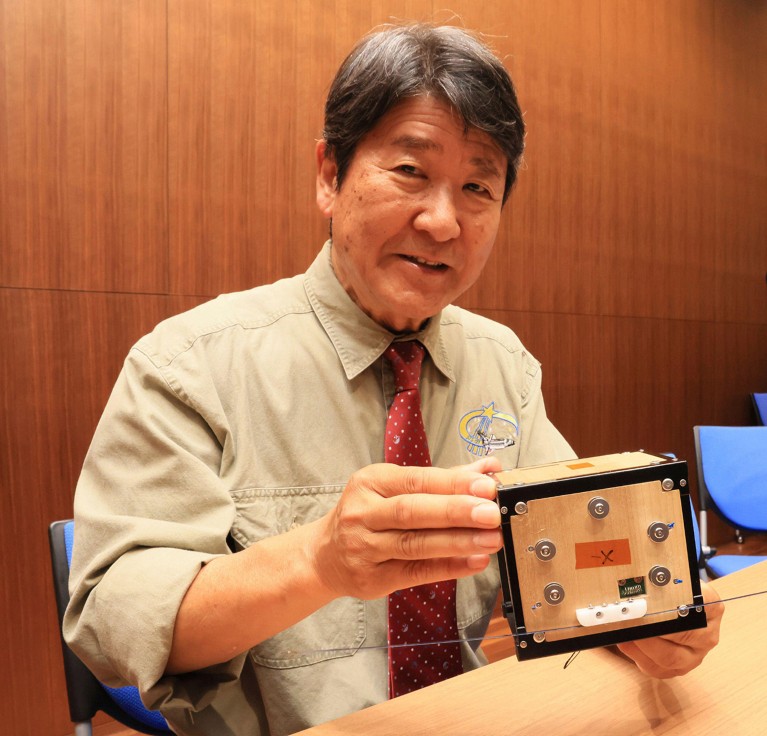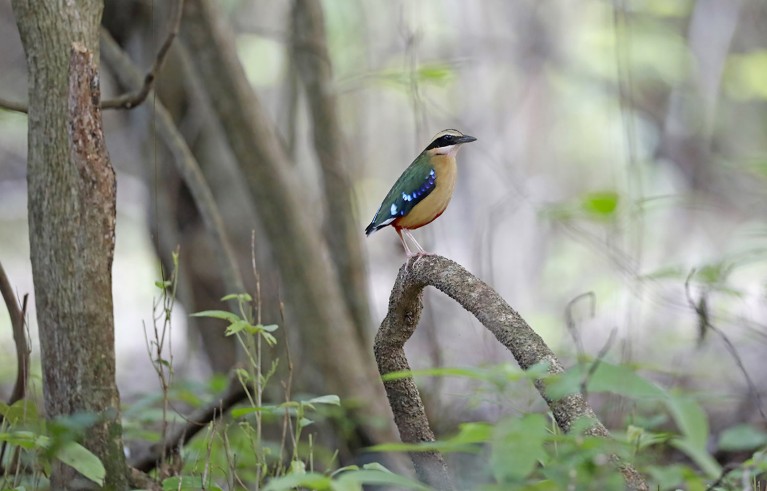Hello Nature readers, would you like to get this Briefing in your inbox free every day? Sign up here.

Takao Doi, an astronaut and engineer at Kyoto University, holds the world’s first wooden satellite.Credit: Kota Kawasaki/Yomiuri Shimbun via AP/Alamy
Space exploration could become more environmentally friendly, if a project from a group of Japanese scientists goes according to plan. Last month, they revealed a satellite made from magnolia wood, amongst other components. If it sounds like it might burn up in the atmosphere, that’s the plan. The effects of pollution from burning up end-of-life metal satellites are unknown, whereas the magnolia satellite is expected to leave only carbon dioxide and water vapour at the end of its 6–12–month life.
The evidence for human-caused climate change is overwhelming — the big question now is, what to do about it? Scientists are lobbying for an ‘evidence bank’ that synthesizes research showing how well different policies — from carbon taxes to the promotion of electric vehicles — work to address climate change, and under what conditions. “This ‘what works?’ question is now the central question in climate policy,” says climate researcher Jan Minx, who is leading the effort. A meeting in Berlin on Sunday — the What Works Climate Solutions Summit — will be the first to bring together specialists in climate, policy and evidence synthesis to discuss the idea.
South Africa’s birds have officially been recognized with names in the isiZulu language. The chirping Calamonastes fasciolatus is isanyendle (‘like a cricket’) and the bushy-browed Heteromirafra ruddi is unonhlozi (eyebrows), amongst other monikers. The names are a recognition that all South African people have a role in species conservation. “We must all engage with our natural heritage in any language we choose,” says Nandi Thobela from BirdLife South Africa.
Reference: South African Journal of Science paper

The African pitta’s isiZulu name unothingo — meaning rainbow — is a reference to its brightly coloured plumage.Credit: Richard Flack/NaturePL
Features & opinion
The president-elect of Mexico, Claudia Sheinbaum Pardo, has a strong scientific background — but some researchers in the country have expressed concerns that she won’t prioritize evidence-based decision-making. Historians and policy experts who spoke to Nature say science expertise is a double-edged sword among political leaders. Researchers “know very well how to gather information from various actors in society”, says historian of science Sayaka Oki. At the same time, if they rely too much on their own intellect instead of listening to constituents, they can get “trapped in their own self-righteousness”.
A trail guide invites us to retrace the journey of the infamous Peterson expedition of 2058 in the latest short story for Nature’s Futures series.
As an exceptional 12-year-old secondary-school student, inspired by Martin Luther King, Freeman Hrabowski was jailed and almost expelled for participating in the civil rights movement. “It was not a positive experience, as you might imagine, but it taught us that even children could have an impact on their own lives,” he says. “We wanted a better education and we wanted all the rights that other children in America were experiencing every day.” The mathematician later founded a scholarship programme, the Meyerhoff Scholars Program, that has become one of the leading pathways to success for Black students in STEM subjects in the United States. He spoke to Nature for our new Changemakers series.
Nature Podcast | 37 min listen
Subscribe to the Nature Podcast on Apple Podcasts, Spotify or YouTube Music, or use the RSS feed.

